 MyDogBreeds
MyDogBreeds Basenji is originated from Congo but Abruzzenhund is originated from Italy. Basenji may grow 30 cm / 11 inches shorter than Abruzzenhund. Basenji may weigh 32 kg / 70 pounds lesser than Abruzzenhund. Both Basenji and Abruzzenhund has almost same life span. Both Basenji and Abruzzenhund has almost same litter size. Basenji requires Low maintenance. But Abruzzenhund requires Moderate maintenance
Basenji is originated from Congo but Abruzzenhund is originated from Italy. Basenji may grow 30 cm / 11 inches shorter than Abruzzenhund. Basenji may weigh 32 kg / 70 pounds lesser than Abruzzenhund. Both Basenji and Abruzzenhund has almost same life span. Both Basenji and Abruzzenhund has almost same litter size. Basenji requires Low maintenance. But Abruzzenhund requires Moderate maintenance
 The Basenji is an old breeds of domesticated dog and the dog was discovered by Westerners in the Congo region of West Africa in the 19th century. The word ‘Basenji’ means ‘dog of the bush’ the Congo area of Africa. The Basenji falls into the hound category as a hunting dog.
The Basenji is an old breeds of domesticated dog and the dog was discovered by Westerners in the Congo region of West Africa in the 19th century. The word ‘Basenji’ means ‘dog of the bush’ the Congo area of Africa. The Basenji falls into the hound category as a hunting dog.
The dogs were first imported into England and the United States in the 1930s.The Basenji Club of America was started in 1942, and the American Kennel Club recognized the breed in 1943. The new additions also introduced the brindle color pattern to the Western Basenji.
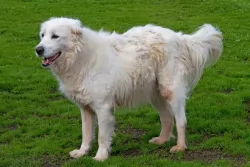 Abruzzenhund was established as an individual breed in the middle of the 20th century. They are descendant of the big, white Eastern sheepdogs which came to Europe 2000 years ago. Abruzzenhund is a mix of Turkish sheepdogs Akbash and Karabash, the Kuvac, Slovakian breed Hungarian breed, Komondor, and a French sheepdog Pyrenean Mountain Dog. Those dogs were much bigger than today’s breed. Abruzzenhund is still not very popular breed, but it is very common in Great Britain and Italy. They have been used as guard dogs, hunting dogs, and working dogs because they are very brave and strong.
Abruzzenhund was established as an individual breed in the middle of the 20th century. They are descendant of the big, white Eastern sheepdogs which came to Europe 2000 years ago. Abruzzenhund is a mix of Turkish sheepdogs Akbash and Karabash, the Kuvac, Slovakian breed Hungarian breed, Komondor, and a French sheepdog Pyrenean Mountain Dog. Those dogs were much bigger than today’s breed. Abruzzenhund is still not very popular breed, but it is very common in Great Britain and Italy. They have been used as guard dogs, hunting dogs, and working dogs because they are very brave and strong.
 Described as being catlike, this is an unusual dog to say the least. The reason for this is that he doesn’t have a bark but rather emits a characteristic noise which is likened to a chortel and a yodel. The Basenji is a medium sized dog but he isn’t robust looking. He is a lightly built dog of 40 – 43cm in height and his coat is short and sleek. He has long legs which help with being quick and agile and his shortish tail curls over his back and he has naturally upright ears.
Described as being catlike, this is an unusual dog to say the least. The reason for this is that he doesn’t have a bark but rather emits a characteristic noise which is likened to a chortel and a yodel. The Basenji is a medium sized dog but he isn’t robust looking. He is a lightly built dog of 40 – 43cm in height and his coat is short and sleek. He has long legs which help with being quick and agile and his shortish tail curls over his back and he has naturally upright ears.
As we’ve said, this is an unusual dog, and his wrinkled head gives the dog a quizzical expression. Another strange feature is that not only is this dog breed looked upon as being somewhat primitive, the odd thing about these dogs is that the female only comes into heat once a year. Another somewhat unusual aspect of this self-confident, friendly dog is that unlike other dogs which have a typical dog odour, this canine is odourless, making him a particularly excellent household pet.
His coat comes in different colors and this can be red and white, tan, tan and white as well as black and white or tri-color. These particular dogs are well known for their excellent eyesight and their excellent sense of smell.
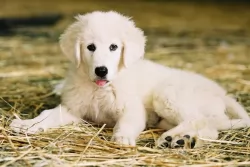 A height of Abruzzenhund variates between 60-73 cm, males are slightly bigger than females. While the weight is 30-45kg, again, males are heavier than females.
A height of Abruzzenhund variates between 60-73 cm, males are slightly bigger than females. While the weight is 30-45kg, again, males are heavier than females.
Abruzzenhund lifespan is between 11-13 years, but since these dogs don’t have any weaknesses and don’t tend to get sick, they can live longer with a proper care and adequate food and training.
Litter size of Abruzzenhund depends, but as any large breed, they usually have 6-9 puppies. And that is a very good considering size of the breed.
Abruzzenhund is not the only name of this breed. There are more names that you might hear. You can hear names like Maremma, Pastore, Abruzzese, Cane da Pastore, Maremmano- Abruzzese, Italian Sheepdog, and many similar names. Basically, they sound similar but there are differences.
Abruzzenhund is a friendly dog, but it is very powerful. Very strong jaw with a scissors bite makes them very strong. They have small but intelligent eyes, usually dark colored. The undercoat is dense, while the coat is white with segments of ivory to white yellow. Their long undercoat and coat make them winter resistant.
 The Basenji is an affectionate dog with his family, but he doesn’t take kindly to strangers. If he is socialized when young, he’ll be fairly friendly with other pets in the family too. The Basenji is an intelligent dog but not particularly easy to train, and will require patience as he has a will of his own.
The Basenji is an affectionate dog with his family, but he doesn’t take kindly to strangers. If he is socialized when young, he’ll be fairly friendly with other pets in the family too. The Basenji is an intelligent dog but not particularly easy to train, and will require patience as he has a will of his own.
These short-haired dogs are clean-living with grooming habits similar to a cat. They shed just a little too. They love their human family and will make a good watchdog because they are courageous dogs, ready to defend what they love.
This is an unusual dog, and not everyone will appreciate him as a pet as he is independent, obstinate and determined to do his own thing. If you’re a single person or a family who spends a lot of time outdoors hiking, swimming and hunting – then the Basenji can make an affectionate devoted, loyal companion.
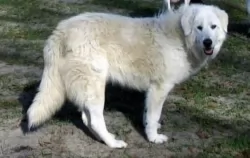 Abruzzenhund is a very well-balanced breed who loves spending time with other animals and people. They have a very good temper. They love being around families, and they are very gentle with children. It is important to train Abruzzenhund properly because the dog of that size should be a leader. A human with a strong character should train this breed. Training is important because they tend to make their own decisions which can be bad sometimes.
Abruzzenhund is a very well-balanced breed who loves spending time with other animals and people. They have a very good temper. They love being around families, and they are very gentle with children. It is important to train Abruzzenhund properly because the dog of that size should be a leader. A human with a strong character should train this breed. Training is important because they tend to make their own decisions which can be bad sometimes.
 Basenji are generally healthy dogs. As with most other canines, these dogs are also prone to health disorders such as canine hip dysplasia. Check your Basenji for hereditary eye diseases which can lead to blindness.
Basenji are generally healthy dogs. As with most other canines, these dogs are also prone to health disorders such as canine hip dysplasia. Check your Basenji for hereditary eye diseases which can lead to blindness.
This is a kidney disease where your pet will urinate out the protein he so badly needs. He’ll be excessively thirsty and the disease mostly sets in from 4 years of age. It is an inherited kidney disease which can be fatal.
Many health problems can be partially- or totally prevented by the way you raise your puppy, and the lifestyle you provide him with. By doing everything you can to give him good food, a dry, warm space to sleep, lots of activities and exercise and plenty of love and attention, you’ll have less health problems.
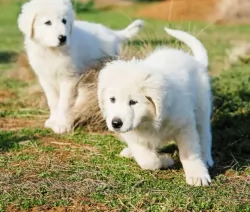 A great thing about Abruzzenhund is that they are very healthy dogs. They don’t have any chronical health problems, so if you are feeding your dog properly, with a lot of exercises they will not have any health problems. It is also important to check genetics of the dog.
A great thing about Abruzzenhund is that they are very healthy dogs. They don’t have any chronical health problems, so if you are feeding your dog properly, with a lot of exercises they will not have any health problems. It is also important to check genetics of the dog.
 Basenjis are fastidious – much like a cat, and they like to be licking at their coats to keep themselves clean. They have a short coat, and this will need to be brushed once or twice a week to get rid of loose hairs and to also stimulated skin oils throughout the coat to keep it shiny and glossy.
Basenjis are fastidious – much like a cat, and they like to be licking at their coats to keep themselves clean. They have a short coat, and this will need to be brushed once or twice a week to get rid of loose hairs and to also stimulated skin oils throughout the coat to keep it shiny and glossy.
As with all dog breeds, the Basenji‘s ears should be checked over and his nails regularly trimmed.
The Basenji needs high quality dog food, regardless of whether you food him commercially manufactured foods or you make your own. If you aren’t sure about how to feed a dog properly to maintain good health, speak to your veterinarian. Dog food needs to be appropriate to the dog’s age and his breed type. Certainly it can be wise to learn what human foods can be dangerous for your dog. Clean, fresh water from bowls which are regularly cleaned should be accessible at all times.
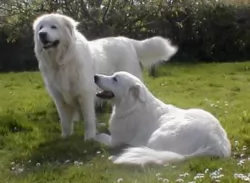 They learn very quickly, but it requires strong will and constant training to keep them happy. They are great working dogs, and with the positive training, they are amazing. It is very important that they follow rules and to keep them in balance with training.
They learn very quickly, but it requires strong will and constant training to keep them happy. They are great working dogs, and with the positive training, they are amazing. It is very important that they follow rules and to keep them in balance with training.
They can eat a lot of food, depend on their activity. High-Quality dog food twice a day for a grown dog is a must. While puppies should eat 3-5 times, smaller portions of food. The food is important especially for working dogs, they need up to 2000-3000Kcal per day. Abruzzenhund will enjoy eating meat with a lot of vegetables and oil.
They are not recommended for small house or apartment. They need big yard because they require a lot of space. During the winter they can be outside because of their coat, but during the summer they need to be in the shade with a lot of fresh water available anytime.
The coat should be brushed and groomed very often because they have a thick coat. There is a lot of dead and loose hair in it. During shedding, period takes even more time to groom your dog properly. They love and they need exercise. Mental exercise is important as physical. Every day walking, running, playing with other animals is an important part of dog's activity. When they get enough quality exercise, they will sleep in the house.